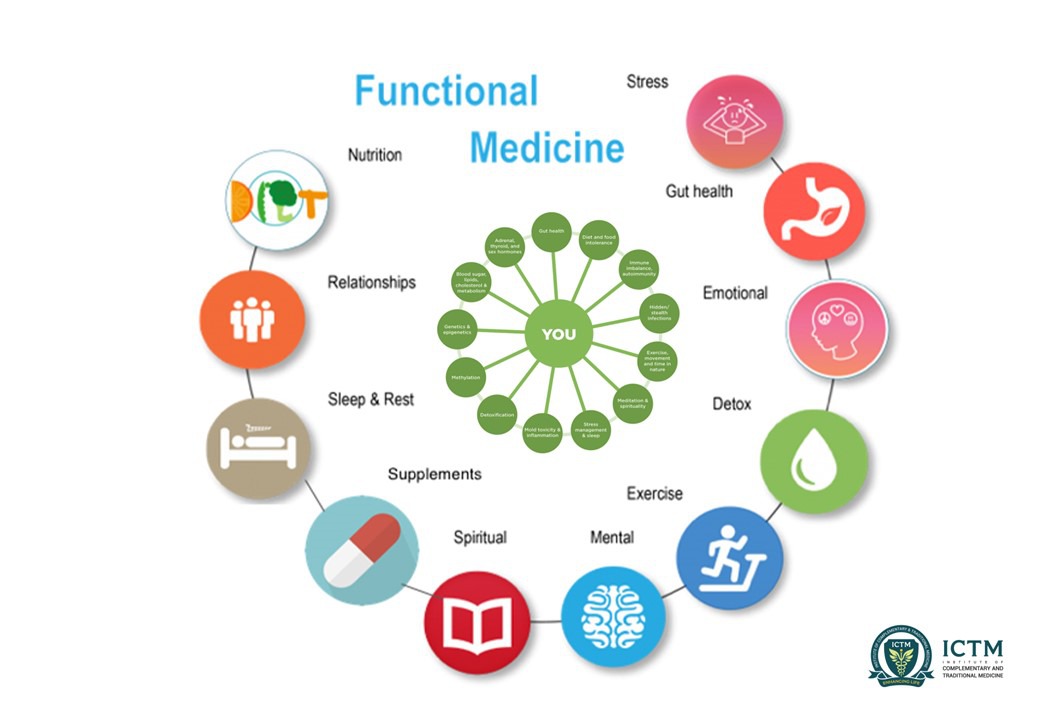Is Aromatherapy combined with Traditional Chinese Medicine a good match?
Secretary-General ICTMNutritional & Functional Medicine

Secretary-General ICTM
Nutritional &
Functional Medicine Practitioner, DSY Wellness & Longevity Center
McMed (NM), F’Ship
Anti-Aging Metabolic & Functional Medicine (A4M, USA)
Functional
Medicine And Its Role In Chronic Health Disorder
Functional
medicine is a system-based approach that sees organs and body systems are
interconnected, and the body’s function makes up the matrix. It believes in
seeking the root cause of health problems to treat and prevent them. Functional
medicine practitioners tend to do an in-depth and comprehensive assessment to
look into all body systems when a disease occurs.
What
function medicine comprises, and what are its practices?
The
functional medicine model sees our human body as a matrix. And the matrix
interacts with our genes, environment, bacteria, virus, etc.
And
this matrix comprises seven factors which are:
-
Assimilation
-
Biotransformation & Elimination
-
Defense & repair
-
Structural integrity
-
Communication
-
Energy
-
Transport
Generally speaking, functional medicine comprises several
interventions, including nutrition, movement, stress management, sleep and
relationships and other restorative therapies.
People are often confused between functional medicine
and functional nutrition. Because functional nutrition is one of
the most common practices of functional medicine, and it uses diet
interventions to restore body balance.
A
person has several health issues simultaneously, which are not rarely seen
nowadays. Still, in conventional medicine practices nowadays, medical
practitioners tend to separate the problems according to diagnostic codes. And
what functional medicine does is to gather all the patient’s history into a
complete patient story. From the perspective of functional health, all health
issues have their own predisposition, provoke and contributing factors. Many
chronic health disorders are tough to diagnose for several reasons, especially
when the patient’s doctor doesn’t know their complete past medical history.
What
is the effectiveness of functional medicine against chronic health disorders?
Chronic
fatigue syndrome
It
is a syndrome characterised by people who always feel extremely tired even
though they have had sufficient rest or sleep. The CDC criteria for chronic
fatigue syndrome are post exertional malaise; unrefreshing sleep; impaired
memory or concentration; muscle pain; polyarthralgia, sore throat; tender lymph
nodes; or new headaches. It is a highly complex disorder that is hard to
diagnose by medical professionals. Currently and unfortunately, there is no
golden treatment or cure for chronic fatigue syndrome, and it can only be
managed.
But,
the good news is that some people with chronic fatigue syndrome are relieved
and nearly recover after functional medicine therapy.
Rather
than treating symptoms, functional medicine practitioners will look into and
address underlying body system dysfunction such as inflammation levels, thyroid
function, adrenal function, nutritional status, etc. After that, they will
design an individualised plan consisting of nutrients, stress management,
exercise, acupuncture and regular detoxification for the patient. Some studies
showed patients experienced steady and significant improvement, and some even
received unexpected resolutions.
Chronic
Pain
Chronic
pain is long-standing pain that persists with an unusually long recovery period
or occurs along with chronic health disorders. Chronic pain, physical health
and mental health are intricately interwoven. A long-term pain in any part of
the body can be a catalyst for anxiety and severe depression. And patients who
suffer from chronic pain often need painkillers like NSAIDs or even opioids.
Still, however, in conventional medicine, they may not meet the prescription.
Therefore,
some clinicians may choose the biopsychosocial approach to manage chronic pain,
which involves nociceptive, affective, sociocultural, behavioural, and
cognitive. And then, they interpret and connect the webs of the possible cause
so they can dig into the cause of chronic pain.
Chronic
sinusitis
Many
people suffer from sinus congestion, and you can always hear the sound of
blowing nose these days. The common symptoms of sinusitis are a pain in the
face, runny nose and throbbing pressure in the head. If an infection is
identified, conventional medicine practitioners will use antibiotics and
symptomatic drugs to treat it. However, many people cannot resolve sinusitis
despite receiving long-term medical or surgical treatment. Therefore,
identifying the root cause (whether it is food or airborne allergen or
something else) becomes the most critical part of dealing with chronic
sinusitis. The functional medicine practitioners will thoroughly check the
patient history and conduct further tests such as nasal culture, allergen
testing or elimination test. And also they consider the patient’s immune
system, which may involve bacterial imbalance and chronic inflammation. If the
patients are found to have dysbiosis, the clinicians may prescribe them some
nutritional supplements such as prebiotics and probiotics to restore their gut
health and the immune system.
Conclusion
Rome
does not build up in one day; chronic diseases develop over time, and it takes
time to restore and heal your body slowly. Functional medicine traces the root
cause of disease, which helps to address long-term chronic health problems that
seem hard to tackle. And yes, you can see rising studies of how functional
medicine practices can effectively have fewer side effects (because it just
helps you to improve daily routines) for people with chronic diseases. Not only
those with the above disorders we mentioned but also effective with other
chronic metabolic illnesses such as hypertension, diabetes and thyroid
disorders.
Lastly,
always remember that if you want to seek advice, please find certified
functional health practitioners, and never agree to start any treatment
yourself before being properly diagnosed by professionals.